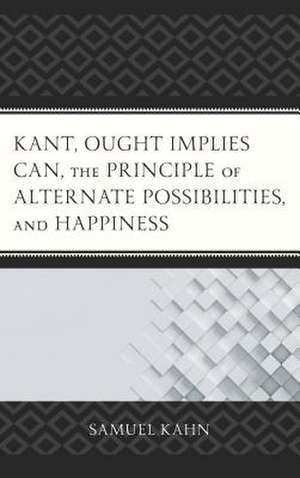Kant, Ought Implies Can, the Principle of Alternate Possibilities, and Happiness
Autor Samuel Kahnen Limba Engleză Hardback – 30 dec 2018
Preț: 686.57 lei
Preț vechi: 891.65 lei
-23% Nou
Puncte Express: 1030
Preț estimativ în valută:
131.42€ • 142.80$ • 110.46£
131.42€ • 142.80$ • 110.46£
Carte tipărită la comandă
Livrare economică 21 aprilie-05 mai
Preluare comenzi: 021 569.72.76
Specificații
ISBN-13: 9781498519618
ISBN-10: 149851961X
Pagini: 306
Dimensiuni: 152 x 229 x 26 mm
Greutate: 0.54 kg
Editura: Rowman & Littlefield
ISBN-10: 149851961X
Pagini: 306
Dimensiuni: 152 x 229 x 26 mm
Greutate: 0.54 kg
Editura: Rowman & Littlefield
Notă biografică
By Samuel Kahn
Cuprins
Introduction
Part One. Ought implies can in Kantian ethics
Chapter 1. Terminology and Exegesis Section 1. Terminology Section 2. Exegesis
Chapter 2. Arguments in Favor of OIC Section 1. Kant¿s argument for OIC Section 2. The argument from explanation Section 3. The fairness argument Section 4. The prescriptivist argument Section 5. The argument from deontic logic
Chapter 3. Objections to OIC Section 1. The appeal to alternate traditions Section 2. The epistemic argument Section 3. The ordinary language objection Section 4. The appeal to culpable inability Section 5. The argument from past obligations Section 6. The argument from simplicity Section 7. The argument from excuses Section 8. The appeal to Hume¿s principle Section 9. The argument from reasons Section 10. The moral satisfaction objection Section 11. The appeal to obligations from nowhere Section 12. The argument from interdependence Section 13. The argument from epistemic oughts Section 14. The argument from feeling oughts Section 15. The appeal to conflicts of duties Section 16. The argument from emphasis Section 17. The appeal to conversational implicature Section 18. The exphi objection
Part Two. The principle of alternate possibilities
Chapter 4. Setting the stage Section 1. Frankfurt¿s seminal attack Section 2. Conceding PAP but mitigating the consequences
Chapter 5. The connection between PAP and OIC Section 1. OIC entails PAP with respect to blame Section 2. Blame requires impermissibility Section 3. Able not to and able to do otherwise Section 4. Some concluding remarks
Chapter 6. The second line of defense Section 1. The metaphysical premise Subsection 1. Flickers and alchemy Subsection 2. The dilemma defense Subsection 3. The deterministic horn Subsection 4. The new dispositionalists Subsection 5. Morally relevant alternatives Section 2. The moral premise Subsection 1. PAP and OIC Subsection 2. The W-defense Subsection 3. Counterfactual interveners and knowledge Subsection 4. The reliability of intuitions
Part Three. The duty to promote one¿s own happiness in Kantian ethics
Chapter 7. ¿Happiness,¿ ¿general duties¿ and the standard account Section 1. ¿Happiness¿ Section 2. ¿General duties¿ Section 3. The standard account
Chapter 8. The means to happiness, indirect duties and two arguments for a direct duty Section 1. Indirect duties Section 2. Two arguments for a direct duty
Chapter 9. Objections Section 1. Internal incoherence Section 2. The universal desire for happiness Section 3. Happiness as a necessary end Section 4. A duty to promote one¿s own happiness would be otiose Section 5. Happiness is impossible
Notes
Bibliography
Descriere
This book examines three issues: the principle of ought implies can (OIC); the principle of alternate possibilities (PAP); and Kant's views on the duty to promote one's own happiness. It argues that although Kant was wrong to deny such a duty, the part of his denial that rests on a conception of duty incorporating both OIC and PAP is sound.
